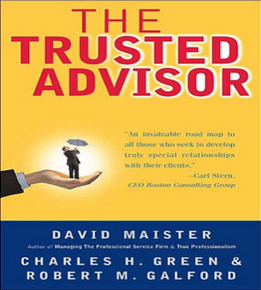Competing with Colleagues
When I wrote The Trusted Advisor with David Maister and Rob Galford, it became reasonably successful within several months. (Amazingly, it still ranks #11,014 – as of this morning – on the list of all books on Amazon. That’s all books, including Harry Potter (#218), Capital (#16,000), etc. I’ll take long-sellers over best-sellers any day of the week).
With its success came a happy problem: how to parcel out the leads between the three of us? Let me be clear, the book wasn’t drowning us in leads; any one of the three of us could have happily fielded all inquiries. And while we wanted to be fair to each other, we were also all of us very clearly in competition with each other.
So the question: how do you compete with colleagues?
Competing with Colleagues
What if one of us got a lead based on the book? Did we have any obligation to pass it along to the other two? If so, how? Should we establish a quota system, whereby each of us would get every third lead?
Should we let the market dictate things, and let whomever the client had reached out to handle the response? What if the client had written to all three of us? Should we all respond confidentially, or in some sense share our responses?
The problem was not unique to us, though it seemed so at the time. You may face a similar problem within your organization – who gets the lead? Who gets to present?
Or, you may come face to face with an old friend who has changed uniforms and now works for a competitor. In any case, the tension is much the same – the sensation of being a colleague feels intensely in conflict with the sensation of being a competitor.
How do you resolve it?
The Solution
The answer to the problem came to us fairly quickly, on reflection, and I documented it as part of the Four Trust Principles in my later books. The answer lies in true focus on client needs.
In our case: we agreed that we should all respond similarly to all client inquiries, regardless of to whom they were addressed. In all cases, we would say words to the effect of:
The Trusted Advisor was written by the three of us. I suspect that each of us could do an excellent job in response to your query, and each of us would handle the work slightly differently. You would be best served by having discussions with each of us, and making up your mind on that basis.
We will each be candid with respect to our own strengths and weaknesses, and answer questions to the best of our ability about the others. Each of us will respect your decision, and we are each committed to you making the best decision possible for you.
The best decision for you is what all three of us seek, and each of us will do our best to help you reach it, regardless of your choice.
This solution made everything easier. It kept our relationship collegial. It removed any awkwardness about responding to clients. It removed any awkwardness that clients might experience in choosing whom to talk to.
And, of course, it resulted in the best decision for clients, as each of us have our own particular skills and drawbacks.
So what’s the answer? Grindingly relentless focus on client service, and the willingness to pursue that logic wherever it leads.


 Remember all those curmudgeonly quips about how online “friends” were cheapening the real thing? How the Facebook generation was mistaking true friendship for the faux, virtual kind?
Remember all those curmudgeonly quips about how online “friends” were cheapening the real thing? How the Facebook generation was mistaking true friendship for the faux, virtual kind?